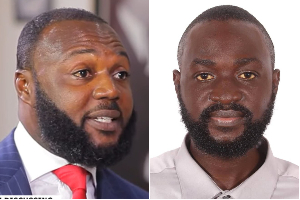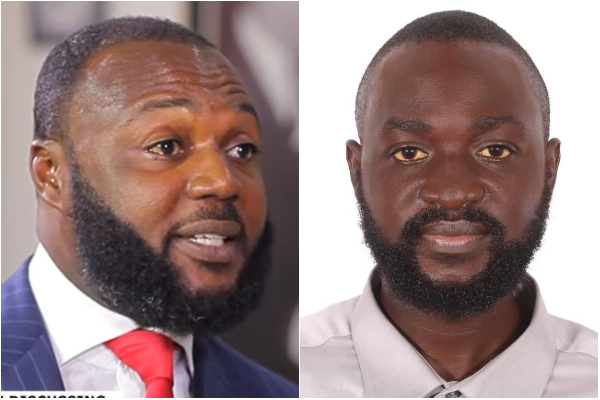 Nii Marmah (R) has written about Ato Essien (L)
Nii Marmah (R) has written about Ato Essien (L)
As former Capital Bank CEO William Ato Essien lies seriously ill in prison, medical facility, calls are intensifying for his immediate release on humanitarian grounds.
His deteriorating condition, confirmed by medical professionals, has reignited a crucial national conversation: Is imprisonment in Ghana serving the cause of justice, or is it veering into silent execution through medical neglect?
Mr Essien, who is serving time for financial crimes, is reportedly battling a life-threatening illness that prison authorities are neither equipped nor positioned to treat effectively.
According to medical reports, submitted to International Amnesty organisations by his legal team, his condition requires urgent, specialised care beyond what Ghana’s prison system can provide.
At the heart of this issue lies a simple but profound truth: the purpose of imprisonment is correction and accountability, not death by neglect.
Ghana’s justice system does not include capital punishment for financial crimes, yet the conditions under which some prisoners are held effectively amount to life-threatening treatment.
“Punishment must never be confused with inhumanity.
When an inmate’s medical needs are ignored until it’s too late, the prison system becomes an instrument of silent execution,” said a senior human rights advocate.
Human Rights and Legal Framework
Ghana’s Constitution, under Article 15, affirms that the dignity of all persons is inviolable, and that no individual shall be subjected to inhuman or degrading treatment.
Article 12 guarantees that human rights apply to all persons, including prisoners.
Internationally, the United Nations Standard Minimum Rules for the Treatment of Prisoners (Mandela Rules), to which Ghana is a signatory, require that prisoners receive the same level of health care as the general population. Rule 24 is unequivocal: “Health-care services shall be organised in close relationship to the general public health administration and in a way that ensures continuity of treatment and care.”
Precedents for Medical Release
Releasing prisoners on compassionate or health grounds is not unprecedented.
In Ghana, figures like former minister Dan Abodakpi and other high-profile detainees have, in the past, received medical bail or release in recognition of their urgent health needs.
Globally, courts have upheld the release of inmates facing dire medical conditions to prevent cruel or inhuman punishment.
In South Africa, terminally ill apartheid-era assassin Eugene de Kock was granted medical parole.
In the US, dozens of inmates have been released under the “compassionate release” framework, recognising that justice should never come at the cost of a person’s right to life and dignity.
A Matter of Conscience
No one is arguing against accountability. Mr Essien has faced legal consequences for his actions.
But if the state, fully aware of his medical state, fails to act, it risks transforming punishment into something far darker and irreversible.
This is not about exoneration; it is about preserving the line between justice and cruelty.
Ghana must decide: will it allow its prisons to become de facto death sentences for the ill, or will it reaffirm its commitment to correction, fairness, and dignity?
The choice, ultimately, is a moral one. And it must be made quickly before silence becomes complicity, and punishment becomes execution in all but name.


